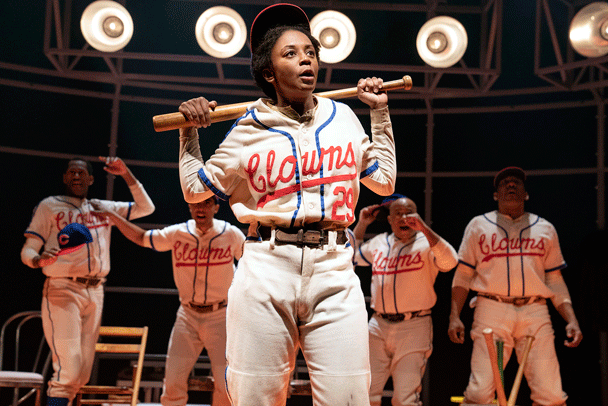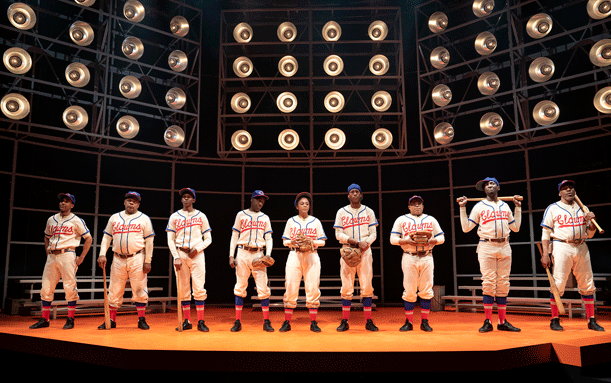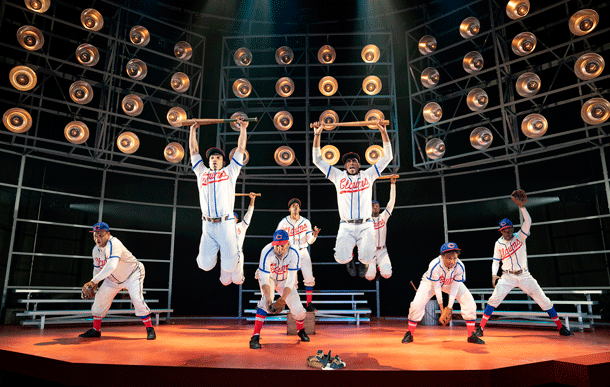A Baseball Great Gets Her Turn at Bat in Toni Stone

(© Joan Marcus)
Baseball fans know their names: Jackie Robinson, the man who changed the course of baseball history when he became the first African American to play Major League Baseball in 1947; Satchel Paige, the first player from the Negro League to pitch in the World Series in 1948. But some fans may not know the name Toni Stone, the first woman to play professional baseball in the Negro League when she joined the San Francisco Sea Lions in 1949.
Toni Stone knew Robinson's and Paige's names — and all the other names in baseball for that matter (she memorized stats obsessively) — and brought her knack for the game to the field when she took Hank Aaron's spot on second base for the Indianapolis Clowns in 1953. Now, with the world premiere of Lydia R. Diamond's compelling, solidly performed, must-see play Toni Stone, running at Roundabout's Laura Pels Theatre, Toni's name will be imprinted in our memories too.
Like she's rattling off the stats of her own life, Toni (April Matthis) introduces us to the eclectic personalities that make up the Indianapolis Clowns (uniforms designed by Dede Ayite recall the team's 1953 home jerseys), who barnstorm across America playing baseball and, for better or worse, entertaining crowds. There's the comical King Tut (Phillip James Brannon), the limber-legged Stretch (Eric Berryman), the bookish Spec Beebop (Daniel J. Bryant), the closeted Elzie (Jonathan Burke), the rookie Jimmy (Toney Goins), and the macho Woody (Ezra Knight). (A couple of players, such as Rufus McNeal, are introduced but then go unmentioned for the rest of the play.)
Though she earns the respect of her teammates, nothing that Toni achieves comes easy. Her parents discourage her from pursuing baseball. Men don't take her seriously. And Jim Crow America treats her and other black baseball players either like sideshow acts or ego-threatening upstarts. Still, she earns her way into the big leagues by knocking "you can't do that" out of the park over and over again.

(© Joan Marcus)
But Toni's analytical mind hasn't prepared her for romance. So when businessman Aurelious Alberga (strong performance by Harvy Blanks) begins wooing Toni with intention to wed, she turns for advice to Millie (played with sensitive humor by Kenn E. Head), a prostitute with whom Toni sometimes stays while on the road. "I don't have time for that," says Toni, referring to the confusing curveball called love. If she says yes to Alberga, will married life cause her to sacrifice the game? That would leave her having to negotiate a completely unfamiliar kind of contract.
Diamond based her play on Martha Ackmann's relatively straightforward biography Curveball: The Remarkable Story of Toni Stone, but in her play, she has Toni toss memories to us as they come to her. "Never could tell a story from beginning to end all nice and neat," she says. "My brain don't work that way." So her story becomes a kind of memory play set in the baseball diamond of her past. Rows of stadium floodlights rise above three short rows of bleachers in Riccardo Hernandez's set as the team plays and practices (Broken Chord designed the realistic sounds of baseballs snapping into mitts and popping on bats). And Allen Lee Hughes illuminates the corners of Toni's mind with gentle spotlights, allowing her memories of Alberga and Millie to occasionally interweave, dreamlike, in a single scene or conversation.
April Matthis gives a stunning, highly polished performance as the literal-minded Toni. She's supported by a strong cast (several of which step into other roles as new memories emerge), with especially memorable performances from the commanding and hilarious Brannon as King Tut, and Knight in his menacing portrayal of Woody.
Director Pam MacKinnon captures the social tensions of the era and shows how racism permeated Toni's life off and on the field. Performing for whites meant the Clowns had to literally clown around (sometimes mimicking offensive stereotypes) on the field to bring in more spectators. "That's the reach we have to do to get to the thing we're here to do," Toni tells us. Choreographer Camille A. Brown brilliantly depicts this demeaning reality in a jarring scene in which the team's warm-up routine gradually morphs into a nightmare of minstrelsy. With devastating power, the scene hits home.
More than just providing illuminating theater and timely social commentary, Toni Stone gives long overdue credit to a woman who had to fight as hard as or harder than any man in her sport just to play the game she loved — and make a living at. The qualities and achievements of such a person are worth attention and emulation. You know Jackie Robinson. Now meet Toni Stone.

(© Joan Marcus)










